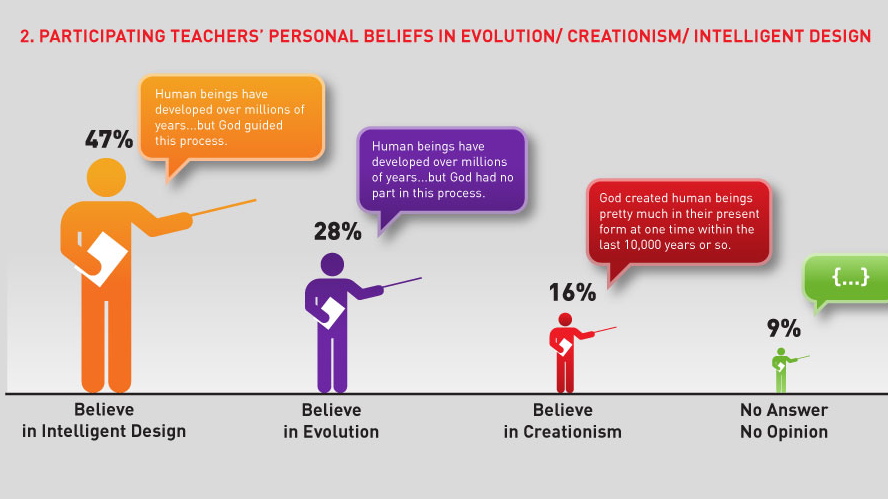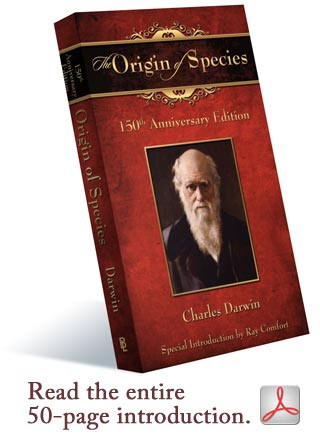Recent posts by
PZ Myers at Pharyngula and
Jerry Coyne at Why Evolution is True have brought attention to the figure below, which suggests 47% of high school biology teachers believe in intelligent design creationism (ID). The figure comes from
this PLoS Biology article which summarizes the results of a survey of 939 high school biology teachers. While these numbers are troubling, I think they and others are making two big mistakes in their commentary on these results.
Figure 1: A stripped-down and prettied-up version of Table S2 (see below).
First, we shouldn't give a dead rats ass what any teacher's personal beliefs are - only what say and do in the classroom. Period. When their personal beliefs become a problem in the classroom, then it's their actions that become fair game, not their personal beliefs.
Second, it's a mistake to say that 47% of high school biology teachers "believe in intelligent design" given these data. To be clear, I'm not saying that those 47% aren't a concern - just that many of them might be doing a good job of teaching evolution in the classroom and that (as a group) they're much less of a concern than are that whopping 16% who are young earth creationists (YECs). Again, these data don't quite clarify what's being taught in the classroom or how it's influenced by a teacher's personal beliefs, so I'm cautious to jump to any strong conclusions.
Both Myers and Coyne claim, as does the figure above, that 47% "believe in intelligent design" because those teachers believ there was some intervention in human origins and/or evolution from a supernatural entity. Sorry, but that isn't intelligent design and not all creationists are equally problematic.
Consider this definition
from Wiktionary (emphasis added by me):
Etymology:
Coined in the 1987 draft of Of Pandas and People by Percival Davis and Dean H. Kenyon, as a repackaging of the term creationism after the U.S. Supreme Court ruled against the teaching of creationism in Edwards v. Aguillard (1987).
Proper noun:
intelligent design
- A conjecture claiming that biological life on Earth, or more broadly, the universe as a whole, was created by an unspecified intelligent agent rather than being the result of undirected natural processes.
That "
rather than" is important, and largely why I disagree with Coyne and Myers. ID
rejects the idea that complex organisms and structures can result from natural processes alone, and I can't assume all 47% believe that. Without further evidence that those 939 high school biology teachers
actually knew what ID was when they took the survey, I can't get too worried about them failing to teach evolution properly. Other information in the PLoS paper (I think) supports this interpretation.
That same study suggests some of that 47% of teachers
don't subscribe to the more troubling aspects of ID. That is, they're a more science-minded group than the general population, and they do a better job teaching evolution than the YECs (though not as good as that 28% who don't believe a god intervened in human evolution).
First, table S4 provides a bit more information than the figure above and Figure 2 in the paper (also
posted by Coyne). To add to what's been said already, the lack of young earth creationists relative to the general population really is good news.
Second, consider the data on the perceived importance of teaching evolution in the biology classroom.
Table S2 from that same paper shows
60% of those same 939 teachers agree that "Evolution serves as the unifying theme for the content of" their high school biology course. Furthermore,
82% think it's impossible "to offer an excellent general biology course for high school students that includes no mention of Darwin or evolutionary theory." While something more like 100% would be best, these numbers paint a much less troubling picture than focusing on the teachers personal beliefs alone.
Lastly, take another look at "how all these beliefs translate into education" by checking out table S5.
Now, 9.6 vs 13.4 vs 16.9 is something worth worrying about. I'd really like to see how other covariates like school curriculum requirements, etc. impact these numbers and just how much of that drop from 16.9 to 13.4 is due to personal religious beliefs relative to those other factors, but again this is what we'd expect to see from a group that contains a mix of good and bad high school biology teachers.
All that said, I do agree with PZ and Jerry that these results do confirm what we already know and recognize as a problem: that there are a significant number of science teachers out there whose personal religious beliefs
do negatively impacting their ability to teach science. I think the real take home message here is that these results highlight the need for schools and the communities they serve to keep working to ensure teachers keep their personal religious beliefs out of the science classroom.
Related Links
- Graphic Biolgy Teacher Survey Results | John Hawks Weblog, 18 July 2010












